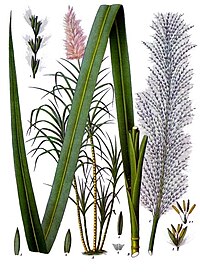
Photo from wikipedia
Abstract The objective of this study was to investigate the effects of ethanol on the physicochemical properties and microbial quality of fresh-cut sugarcane. Ethanol (300 mL/L) treatment resulted in the lowest… Click to show full abstract
Abstract The objective of this study was to investigate the effects of ethanol on the physicochemical properties and microbial quality of fresh-cut sugarcane. Ethanol (300 mL/L) treatment resulted in the lowest weight loss, electric conductivity, and browning and the best quality attributes in fresh-cut sugarcane. It also significantly reduced the activities of polyphenol oxidase, phenylalanine ammonia-lyase and peroxidase and decreased total phenols and quinines contents. The total bacterial count and yeast mold count showed that there was significant suppress of microbial spoilage in fresh-cut sugarcane with ethanol treatment. Ethanol treatment increased the CO 2 production and decreased O 2 level inside the package environment compared to treatments that combined ethanol (300 mL/L) and ascorbic acid (10 g/L) as well as the control (distilled water). Ethanol was the most efficient approach to inhibiting enzymatic browning and controlling microbial growth on fresh-cut sugarcane.
Journal Title: Lwt - Food Science and Technology
Year Published: 2017
Link to full text (if available)
Share on Social Media: Sign Up to like & get
recommendations!